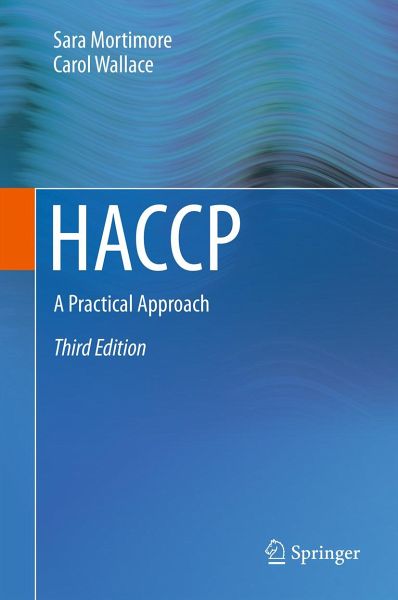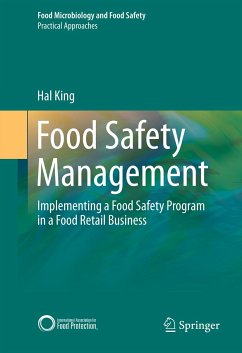
HACCP (eBook, PDF)
A Practical Approach
Versandkostenfrei!
Sofort per Download lieferbar
67,95 €
inkl. MwSt.
Weitere Ausgaben:

PAYBACK Punkte
34 °P sammeln!
HACCP: A Practical Approach, 3rd edition has been updated to include the current best practice and new developments in HACCP application since the last edition was published in 1998. This book is intended to be a compendium of up-to-date thinking and best practice approaches to the development, implementation, and maintenance of HACCP programs for food safety management.Introductory chapters set the scene and update the reader on developments on HACCP over the last 15 years. The preliminary stages of HACCP, including preparation and planning and system design, are covered first, followed by a ...
HACCP: A Practical Approach, 3rd edition has been updated to include the current best practice and new developments in HACCP application since the last edition was published in 1998. This book is intended to be a compendium of up-to-date thinking and best practice approaches to the development, implementation, and maintenance of HACCP programs for food safety management.
Introductory chapters set the scene and update the reader on developments on HACCP over the last 15 years. The preliminary stages of HACCP, including preparation and planning and system design, are covered first, followed by a consideration of food safety hazards and their control. Prerequisite program coverage has been significantly expanded in this new edition reflecting its development as a key support system for HACCP. The HACCP plan development and verification and maintenance chapters have also been substantially updated to reflect current practice and a new chapter on application within the food supply chain has been added. Appendices provide a new set of case studies of practical HACCP application plus two new case studies looking at lessons learned through food safety incident investigation. Pathogen profiles have also been updated by experts to provide an up-to-date summary of pathogen growth and survival characteristics that will be useful to HACCP teams.
The book is written both for those who are developing HACCP systems for the first time and for those who need to update, refresh and strengthen their existing systems. New materials and new tools to assist the HACCP team have been provided and the current situation on issues that are still undergoing international debate, such as operational prerequisite programs. All tools such as decision trees and record-keeping formats are provided to be of assistance and are not obligatory to successful HACCP. Readers are guided to choose those that are relevant to their situations and which they find are helpful in their HACCP endeavors.
Introductory chapters set the scene and update the reader on developments on HACCP over the last 15 years. The preliminary stages of HACCP, including preparation and planning and system design, are covered first, followed by a consideration of food safety hazards and their control. Prerequisite program coverage has been significantly expanded in this new edition reflecting its development as a key support system for HACCP. The HACCP plan development and verification and maintenance chapters have also been substantially updated to reflect current practice and a new chapter on application within the food supply chain has been added. Appendices provide a new set of case studies of practical HACCP application plus two new case studies looking at lessons learned through food safety incident investigation. Pathogen profiles have also been updated by experts to provide an up-to-date summary of pathogen growth and survival characteristics that will be useful to HACCP teams.
The book is written both for those who are developing HACCP systems for the first time and for those who need to update, refresh and strengthen their existing systems. New materials and new tools to assist the HACCP team have been provided and the current situation on issues that are still undergoing international debate, such as operational prerequisite programs. All tools such as decision trees and record-keeping formats are provided to be of assistance and are not obligatory to successful HACCP. Readers are guided to choose those that are relevant to their situations and which they find are helpful in their HACCP endeavors.
Dieser Download kann aus rechtlichen Gründen nur mit Rechnungsadresse in A, B, BG, CY, CZ, D, DK, EW, E, FIN, F, GR, HR, H, IRL, I, LT, L, LR, M, NL, PL, P, R, S, SLO, SK ausgeliefert werden.













